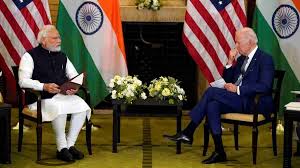Modi and Trump once called each other good friends. Now the US-India relationship is getting bumpy
INDIAN DEFENCE
Once hailed as the champions of a "new era" in U.S.-India relations, Prime Minister Narendra Modi and former U.S. President Donald Trump publicly referred to each other as “good friends,” symbolizing a powerful bond between the world’s largest democracies.


Trump’s recent remarks criticizing India’s energy ties with Russia, his threats of tariffs, and his harsh economic assessments have cast a shadow on the once celebratory narrative. For India, such statements reflect a lack of understanding about its sovereign choices, and for the U.S., it marks a shift from partnership diplomacy to transactional pressure tactics.
The growing divergence isn’t merely rhetorical — it’s rooted in policy shifts, differing global priorities, and a rising assertiveness in India’s foreign policy doctrine. India’s refusal to align blindly with Western narratives, particularly on issues like Ukraine, has invited scrutiny from U.S. political figures, especially Trump, who now views India’s economic maneuvers with suspicion. While India maintains that its engagement with Russia and multi-alignment strategy are based on national interest, Trump's blunt accusations have stirred diplomatic unease. Moreover, his alleged favoritism toward authoritarian regimes like China, despite their far more extensive ties with Russia, has been labeled a double standard by Indian strategists. The sentiment among Indian policymakers is clear — New Delhi will not be coerced, even by its closest partners. What was once a personal friendship between two populist leaders now risks being overshadowed by strategic distrust and economic friction. If not handled with maturity and mutual respect, this bumpy trajectory could affect cooperation in critical sectors like defense technology, semiconductor supply chains, and Indo-Pacific security frameworks, setting back years of progress.
Their camaraderie peaked during the grand events like “Howdy Modi” in Houston and “Namaste Trump” in Ahmedabad, where both leaders shared a stage, applauded each other’s vision, and emphasized a shared commitment to security, trade, and democratic values. These events weren’t just symbolic — they sent strong signals to global observers about a strengthening Indo-U.S. strategic partnership. However, as geopolitical pressures rise and domestic political narratives evolve, the warmth once seen between Modi and Trump has begun to cool, revealing cracks beneath the surface.
